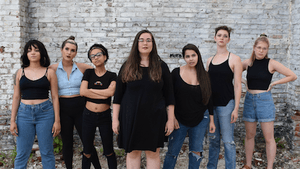Stay in the Loop
BSR publishes on a weekly schedule, with an email newsletter every Wednesday and Thursday morning. There’s no paywall, and subscribing is always free.
When our bodies aren’t ours
Philadelphia Women’s Theatre Festival presents ‘Hear Me War’

The headlining world-premiere musical at the third annual Philadelphia Women’s Theatre Festival (PWTF) bit off a lot in 2017. “This is where things get sticky,” it said. “We want to dismantle the patriarchy.”
On the march
Hear Me War was developed through PWTF’s new Women’s Playwriting Collective. It’s an ensemble piece with some excellent resistance anthems and voices to match.
Featured ensemble member Sarah Galante (a Brooklyn-based writer and UArts alum) wrote the book, music, and lyrics, with additional music and orchestrations by music director Jaime Jarrett (his Normativity recently premiered at UArts’ Polyphone Festival).
Hear Me War follows nine women and non-binary friends who walk 138 miles over four days to “the place where our voices are most infinitesimal”: Washington, D.C. The show was developed before the 2016 election and the Women’s March that may or may not have dwarfed President Trump’s inauguration crowd, but it’d be hard to find a better moment for it.
Hear Me War is pretty light on plot points. It’s a mix of musical calls to arms, marching tunes, lullabies, and episodic memoirs in song. These cover experiences such as assault and abortion and function more as contemporary feminist rallying cries than as a unified story.
Shut that whole thing down
Ensemble member Ariana Sepúlveda sang about surviving sexual assault as the ensemble made an aggressive ring around her, hurling a horrifically standard set of canards about the crime: How much did you drink? What were you wearing? Did you encourage him? Don’t you know this kind of accusation could ruin a man’s life?
The song was heartbreaking enough simply for its refrain, which didn’t lament the assault. Instead, Sepúlveda sang, “Faster, please go faster, so it’s over.”
“We can all remember a time when our bodies weren’t ours,” the ensemble continued.
A flourish of kazoos and wash of angry red light heralded a movement of “thoughtful opinions on our bodies,” featuring “real statements from male politicians.” The ensemble let these fly with a hearty chorus of regimented laughs. It was a selection of memorable gaffes as hilarious as they were humiliating, and you probably wouldn’t believe they were real if you hadn’t heard them on the news yourself (before all news was fake, of course).
Local talent
Brief solo manifestos and layers of choral speech flowed between musical numbers under director Elaina Di Monico, a PlayPenn dramaturg. Costume designer LeVonne Lindsay dressed the marchers in a range of military-style fatigues in khaki, denim, and a flourish or two of camo, plus chunky boots with room for individual flair. Besides Galante and Sepúlveda, the ensemble included Sydney Banks, Mariah Del Rio, Marlee Gordon, Aliria Johnson, Amanda Jill Robinson, Hannah Van Sciver, and Brittany Wit Martin. I especially look forward to seeing more of Del Rio, a recent UArts grad who, along with Banks, has been a singer to watch at the last two years of Polyphone.
Van Sciver (whose Bicycle Face premiered in Philly’s SoLow Fest) added onstage percussion ranging from shiver to heartbeat to martial march. Other performers lent a single violin and a pair of guitars. Jarrett played piano. The stripped-down instruments abetted well-textured, high-caliber voices in the intimate setting. If Hear Me War returns, it’d be interesting to see what could happen with a larger ensemble, perhaps allowing for sharper characterization of core voices and a better visual of a revolutionary march.
Facing violence, in many forms
At the D.C. city line, the ensemble faced a literal fence strewn with a ragged American flag and protest signs, though apparently “hundreds of thousands are flooding the capital with resistance.” Those words sound contrived, but mostly because the Women’s March showed us what this actually looks like.
Contrary to a line in the musical announcing that the protest has been fatal to some, with “a lot of bodies out there,” I remembered how notably peaceful the real Women’s March was, but maybe the allusion to violence here is appropriate.
We just watched an all-male Republican committee attempt to dismantle American healthcare in ways that would profoundly endanger women. When legislators would expressly deny us critical healthcare, that equals a kind of violence and certainly costs lives, even if bodies don’t land on a battlefield.
Fortunately, a tiny but insurmountable coalition of women senators, shut out from negotiations, sank the legislation (for now). As Hear Me War puts it, “the greatest form of resistance is coming together.”
There’s obviously no clear ending to the diffuse but timely saga of Hear Me War, besides its simple but necessary coda: “Keep moving.”
What, When, Where
Hear Me War. By Sarah Galante and Jaime Jarrett, Elaina Di Monico directed. Philadelphia Women's Theatre Festival. Through August 6, 2017, at the University of the Arts' Caplan Studio Theater, 211 S. Broad Street, Philadelphia. phillywomenstheatrefest.org.
Sign up for our newsletter
All of the week's new articles, all in one place. Sign up for the free weekly BSR newsletters, and don't miss a conversation.
 Alaina Johns
Alaina Johns